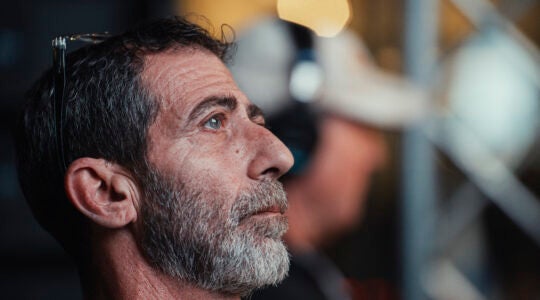YAGUR, Israel (JTA) — The crowd was sparse and admission was free. Pop music from 10 years ago blared from loudspeakers. A few families sat on bleachers near the athletes, who hopped over a low fence when it was time to compete.
The Israeli Equestrian Championships wasn’t the most obvious place to look for an accomplished athlete with Olympic aspirations. But Danielle Goldstein, an American who speaks little Hebrew and spends most of the year in Florida, is Israel’s best hope to compete in equestrian show-jumping at the 2016 Rio De Janeiro Games.
“It’s important to have a presence here,” said Goldstein, 29, as she surveyed the competition last Friday. “I’m excited to be at the championship, in the community.”
A native of New York’s Upper East Side, Goldstein fell in love with horses at an early age and later focused on show jumping, a discipline in which riders traverse a course of obstacles. In high school, she was active in jumping competitions across the United States, but felt drawn to the prospect of representing Israel after traveling there on a bat mitzvah trip.
So her decision to apply for Israeli citizenship after going pro in 2010 came naturally to her, but it surprised the Israel Equestrian Federation.
“It’s not something that was like, ‘Yeah, great,’ ” Goldstein said. “It was very much like, ‘Who are you? What are you doing?’ ”
Goldstein says joining Israel’s horse riding scene has been “a little of an initiation,” but she feels welcomed. Since immigrating, she has qualified for this year’s International Equestrian Federation World Games, putting her on the verge of qualifying for Rio.
But she isn’t content with carrying Israel alone on horseback. Goldstein and another New Yorker, Deborah Schultz, are working together to promote horse riding in Israel, both by getting more people in the saddle and by teaching skills to more experienced riders.
Schultz’s nonprofit, The Equine Athletic Mission Israel — or TEAM Israel — organizes riding clinics hosted by Goldstein and other Israeli riders, and works to coordinate teams for international equestrian events. With the support of TEAM Israel, which was founded last year, Israel fielded a show jumping team in the 2014 FEI Nations’ Cup for the first time.
“The more we do this, the more people who ride are popping out of the woodwork,” Schultz said. “Every time you bring a new sport to Israel, they’re typical Israelis, [saying] ‘Eh, no.’ But then it happens.”
Immigrants have played a large role in boosting Israeli athletics over the years. Soviet immigration in the 1990s helped broaden Israel’s presence at the Winter Olympics, while North Americans have helped expand the state’s athletic repertoire beyond mainstays such as soccer and basketball. Associations promoting Israeli baseball, American-style football, lacrosse and even curling have been launched at the initiative of immigrants.
But unlike those sports, Goldstein has a long tradition to draw upon in helping to push competitive horse riding to a higher level. The Israel Equestrian Federation, the organizer of Friday’s event, has promoted riding in Israel for 50 years, but the sport remains a niche interest.
Federation committee member Noam Zered said the quality of Israeli riding has picked up in recent years as riders gained more access to the sport’s centers in Europe and the United States.
“More of the young generation saw the world and want to have high quality,” Zered said. “People come back here with expectations. We’re building now.”
One up-and-coming Israeli show jumper, Eyal Gat, moved from Israel to the United States at age 16 and has lived for the past year in Holland, which has better access to top horses. Israeli riders have formed a community in Europe, he said, joining last month for a Passover seder in Belgium.
“It’s impossible to advance without being there,” Gat said. “It’s clearly difficult to live alone in a country that’s not yours, but that’s part of the deal.”
While a few Israeli riders lamented that the sport’s popularity is constrained by the high costs of accessing a horse, some Israelis are finding an alternative to the saddle through therapeutic riding, which uses exercises on horseback to improve various conditions. Therapeutic riding is subsidized by the Israeli health system, making it more accessible than recreational riding for those who need it.
Yonatan Dresler, who was born with cerebral palsy, said therapeutic riding has helped him improve his balance and develop a relationship with his horse. Now 27, Dresler rode for Israel in the 2012 London Paralympics and is ranked 10th worldwide in paralympic dressage, another equestrian discipline.
“The connection with the horse makes you feel like you have responsibility over another being,” Dresler said. “Whether the competition is paralympic or [regular] dressage, you need the same abilities.”
Schultz’s goal is to make Israel a place riders can stay if they want to advance. Raised in a religious household in Brooklyn, N.Y., with little exposure to the sport, Schultz insists “the horse thing is in my DNA.”
Now a high-tech consultant, Schultz comes to Israel occasionally to advise Tel Aviv technology companies and wants to bring her start-up mentality to equestrian.
“It’s not part of the myth of Israel,” Schultz said. “But there’s a lot about horses that’s similar to Israel. They’re independent, spirited. This country is ripe for that. I want to get them hooked on horses.”
JTA has documented Jewish history in real-time for over a century. Keep our journalism strong by joining us in supporting independent, award-winning reporting.





